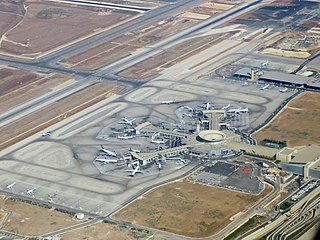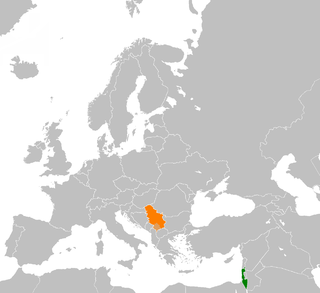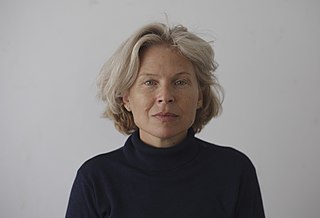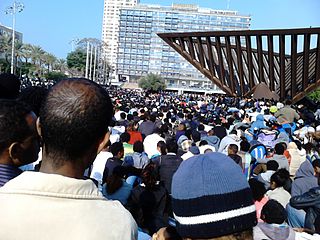
The demographics of Israel, monitored by the Israel Central Bureau of Statistics, encompass various attributes that define the nation's populace. Since its establishment in 1948, Israel has witnessed significant changes in its demographics. Formed as a homeland for the Jewish people, Israel has attracted Jewish immigrants from Europe, Asia, Africa, and the Americas.

Tel Aviv-Yafo, usually referred to as just Tel Aviv, is the most populous city in the Gush Dan metropolitan area of Israel. Located on the Israeli Mediterranean coastline and with a population of 467,875, it is the economic and technological center of the country. If East Jerusalem is considered part of Israel, Tel Aviv is the country's second-most-populous city, after Jerusalem; if not, Tel Aviv is the most populous city, ahead of West Jerusalem.

Ben Gurion International Airport, commonly known by the Hebrew-language acronym Natbag, is the main international airport of Israel. Situated on the northern outskirts of the city of Lod, it is the busiest airport in the country. It is located 45 kilometres (28 mi) to the northwest of Jerusalem and 20 kilometres (12 mi) to the southeast of Tel Aviv. Until 1973, it was known as Lod Airport, whereafter it was renamed in honour of David Ben-Gurion (1886–1973), the first Israeli prime minister. The airport serves as a hub for El Al, Israir Airlines, Arkia, and Sun d'Or, and is managed by the Israel Airports Authority.

Ramat HaSharon is a city located on Israel's central coastal strip in the south of the Sharon region, bordering Tel Aviv to the south, Hod HaSharon to the east, and Herzliya and Kibbutz Glil Yam to the north. It is part of the Tel Aviv District, within the Gush Dan metropolitan area. In 2021 it had a population of 47,970.

Aliyah is the immigration of Jews from the diaspora to, historically, the geographical Land of Israel or the Palestine region, which is today chiefly represented by the State of Israel. Traditionally described as "the act of going up", moving to the Land of Israel or "making aliyah" is one of the most basic tenets of Zionism. The opposite action — emigration by Jews from the Land of Israel — is referred to in the Hebrew language as yerida. The Law of Return that was passed by the Israeli parliament in 1950 gives all diaspora Jews, as well as their children and grandchildren, the right to relocate to Israel and acquire Israeli citizenship on the basis of connecting to their Jewish identity.

Bar Refaeli is an Israeli model, television host, businesswoman and actress. She is among the most internationally successful models to come from Israel, appearing on the cover of the 2009 Sports Illustrated Swimsuit Issue, and being voted No. 1 on Maxim magazine's Hot 100 list of 2012. As a television host, Refaeli has hosted The X Factor Israel since 2013 and co-hosted the Eurovision Song Contest 2019 in Tel Aviv.

Yisrael Meir Lau is a Holocaust survivor who served as the Ashkenazi Chief Rabbi of Israel from 1993 to 2003. He was previously Chief Rabbi of Tel Aviv, Israel. After his tenure as chief rabbi, he was appointed chairman of Yad Vashem.
Yerida is emigration by Jews from the State of Israel. Yerida is the opposite of aliyah, which is immigration by Jews to Israel. Zionists are generally critical of the act of yerida and the term is somewhat derogatory. The emigration of non-Jewish Israelis is not included in the term.

The Tel Aviv–Jerusalem railway is a railway line in Israel connecting the cities of Tel Aviv and Jerusalem. The line serves as the main rail link between the two cities, complementing the old Jaffa–Jerusalem railway. As such, the railway is often referred to in Israel as the high-speed railway to Jerusalem to distinguish it from the older, longer and slower line. In spite of that name, the line is not high-speed under the definition used by the International Union of Railways: both its design speed of 200 km/h (125 mph) and its current operational speed of 160 km/h (99 mph) are below the 250 km/h (155 mph) threshold used by the UIC to define high-speed railways, and it is traversed by IR's regular rolling stock instead of the UIC requirement for specially-designed high-speed trains.

The diplomatic relations between Israel and Serbia were established on January 31, 1992, when Serbia was part of FR Yugoslavia. Israel has an embassy in Belgrade and Serbia had an embassy in Tel Aviv. Yugoslavia was the second country in Europe to recognize Israel in 1948. The two countries have economic and cultural ties, helped by a sizable community of Jews from the former Yugoslavia in Israel. Serbia agreed to move its embassy to Jerusalem on 4 September 2020 but decided not to after Israeli recognition of Kosovo as a sovereign state.

Arieh Sharon was an Israeli architect and winner of the Israel Prize for Architecture in 1962. Sharon was a critical contributor to the early architecture in Israel and the leader of the first master plan of the young state, reporting to then Prime Minister, David Ben-Gurion. Sharon studied at the Bauhaus in Dessau under Walter Gropius and Hannes Meyer and on his return to Israel in 1931, started building in the International Style, better known locally as the Bauhaus style of Tel Aviv. Sharon built private houses, cinemas and in 1937 his first hospital, a field in which he specialized in his later career, planning and constructing many of the country's largest medical centers.

Sigalit Landau is an Israeli sculptor, video and installation artist.

Yitzhak Baer was a German-Israeli historian and an expert on medieval Spanish Jewish history.

African immigration to Israel is the international movement to Israel from Africa of people that are not natives or do not possess Israeli citizenship in order to settle or reside there. This phenomenon began in the second half of the 2000s, when a large number of people from Africa entered Israel, mainly through the then-lightly fenced border between Israel and Egypt in the Sinai Peninsula. According to the data of the Israeli Interior Ministry, 26,635 people arrived illegally in this way by July 2010, and over 55,000 by January 2012. In an attempt to curb the influx, Israel constructed the Egypt–Israel barrier. Since its completion in December 2013, the barrier has almost completely stopped the immigration of Africans into Israel across the Sinai border.

The Branch Office of the Embassy of the United States of America in Tel Aviv is part of the diplomatic mission of the United States in the State of Israel. The complex opened in 1966, and is located at 71 HaYarkon Street in Tel Aviv. It served as the United States Embassy until May 14, 2018, when the seat of embassy was relocated to Jerusalem.

The 2011 Israeli social justice protests, which are also referred to by various other names in the media, were a series of demonstrations in Israel beginning in July 2011 involving hundreds of thousands of protesters from a variety of socio-economic and religious backgrounds opposing the continuing rise in the cost of living and the deterioration of public services such as health and education. A common rallying cry at the demonstrations was the chant; "The people demand social justice!".

Prof. Manuel Trajtenberg is an Israeli economist who was the chair of the Planning and Budgeting Committee of the Council for Higher Education in Israel. He was appointed by Israeli Prime Minister Benjamin Netanyahu in August 2011 to lead a committee for negotiations with the Israeli protesters and for recommending economic measures to overcome the crisis. He is currently the Executive Director of the Institute for National Security Studies (INSS).
The following is a chronological summary of the major events that have been taking place during the 2011 Israeli social justice protests.
Boris Lekar, was a multidisciplinary artist, considered by critics as one of the exceptional artists of the Soviet emigration to Israel.

Am Yisrael Foundation is a Tel Aviv and New York–based foundation and umbrella nonprofit organization for a variety of initiatives that promote Zionist engagement among Jewish young adults residing in Israel, including providing leadership platforms for young Jews who have made Aliyah, or are contemplating immigration to Israel.

















